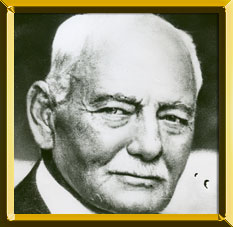
A trainer of championship boxers, William Muldoon was a powerful athlete in his own right, and later became the head of the first modern boxing commission. Born in Belfast, New York in 1852, as a youth, he was a wrestler of some renown. He competed in the "Greco-Roman" wrestling style of the day-which barred holds below the waist. Muldoon became a bouncer and then a policeman in New York City. Known as "The Solid Man" and "The Iron Duke," he wrestled in both professional and amateur matches, defeating the police department champion as well as English wrestler Edwin Bibby.
Muldoon served six years on the police force, then quit to open a bar which was popular with boxers and wrestlers as well as bankers and financiers. He toured the country with boxing champion John L. Sullivan, and the two posed, wrestled, boxed and performed feats of strength in exhibitions. He also acted in stage plays including the role of Charles the Wrestler in As You Like It.
A great believer in physical fitness, Muldoon opened the Muldoon Hygienic Institute in Purchase, New York.
He trained Sullivan for his famous fight with Jake Kilrain at his farm in Belfast, NY, whipping the overweight, out-of-shape Sullivan into fighting trim. Supposedly, Muldoon had to threaten the champ with a baseball bat to get him to follow the training regimen and wrestled Sullivan into submission when he wanted to go out for a drink. Sullivan entered the ring in excellent condition and won the Kilrain fight. Muldoon also trained Kid McCoy and Jack Dempsey, The Nonpareil.
After the Walker Law legalized boxing in New York State in 1920, Muldoon was appointed to chair the New York State Athletic Commission. In this role, Muldoon attempted to bar known gamblers from attending fights, established a no-smoking rule for bouts, and pushed for improved sanitary conditions for boxers. Muldoon was opposed to mixed-race bouts and was voted out of the chairmanship after he refused to approve a fight between heavyweight champion Jack Dempsey and the great black fighter Harry Wills. Nevertheless, Muldoon remained on the commission until 1929.
Muldoon later joined with Gene Tunney to award the Tunney-Muldoon Trophy to world heavyweight champions. He died of cancer in 1933, at the age of 88, having been associated with boxing since its bare knuckle days.
* * *
Excerpted with permission from 'The Boxing Register' by James B. Roberts and Alexander G. Skutt, copyright © 1999 by McBooks Press. All rights reserved.
Born: 1852
Died: 1933
Induction: 1996
William Muldoon
